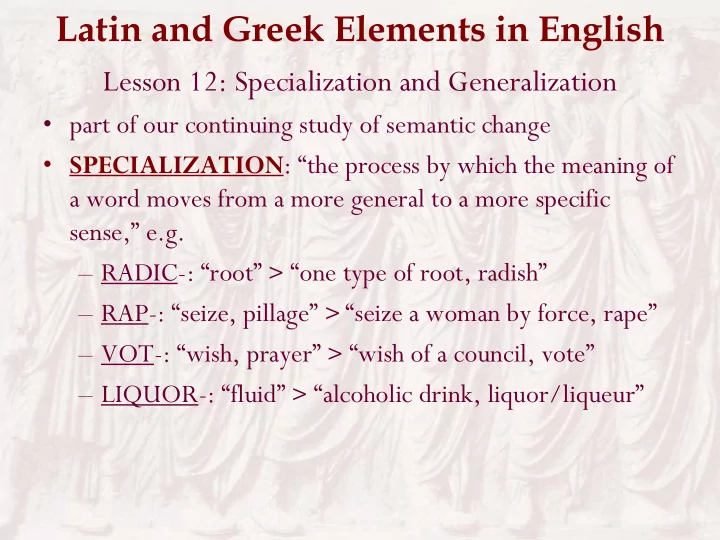

Latin and Greek Elements in English Lesson 12: Specialization and Generalization • part of our continuing study of semantic change • SPECIALIZATION : “the process by which the meaning of a word moves from a more general to a more specific sense,” e.g. – RADIC-: “root” > “one type of root, radish” – RAP-: “seize, pillage” > “seize a woman by force, rape” – VOT-: “wish, prayer” > “wish of a council, vote” – LIQUOR-: “fluid” > “alcoholic drink, liquor/liqueur”
Latin and Greek Elements in English Lesson 12: Specialization and Generalization • GENERALIZATION : “the process by which the meaning of a word moves from a more specific to a more general sense,” e.g. – TREMENDUS: “dreadful, to be trembled at” > “awesome, huge, amazing, very good, tremendous” – COMOEDIA: “party-song, ribald verse” > “humorous drama, anything funny or comical” – TRIUMPHUS: “Roman parade in honor of a victorious general” > “military conquest, any sort of triumph”
Latin and Greek Elements in English Lesson 12: Specialization and Generalization • specialization is much more common than generalization • the reason for this is that English tends to use general Latin- based terms to cover specific things for which there is no existing word – cf. the generalizations cited above were already generalized in antiquity • in general, language tends to move toward more specific terminology as new things come into being and new words are needed for those new things
Latin and Greek Elements in English Lesson 13: Functional Change • FUNCTIONAL CHANGE : “the process by which a word takes on a new usage as a different part of speech, without a change in form or the addition of a suffix” • vs. participles: verbs > adjectives, with the addition of a suffix – e.g. what’s in (or out): preposition > adjective – to out someone: preposition > verb – pros and cons: (Latin) prefix/preposition > noun – to while away the time: conjunction > verb – to firm up: adjective > verb – to black out: adjective > verb
Latin and Greek Elements in English Lesson 13: Functional Change • nouns functioning as adjectives – flower pot – noun suffix – elevator repairman – disk drive – party animal – n.b. the second/last noun is the essential thing • this is a very common feature of Germanic languages: – e.g. National Laboratory Zero Power Plutonium Reactor Criticality Facility
Latin and Greek Elements in English Lesson 13: Functional Change • noun functioning as verbs – a very common feature of English • because we have very few verb-forming suffixes, either from Latin or our Germanic mother tongue • thus, put a noun into the verb slot of a sentence and it’s a verb! – e.g., to film a movie – to telephone your friend – to bag your homework – to finger a criminal
Latin and Greek Elements in English Lesson 13: Functional Change • noun functioning as verbs – to troop around – to panhandle – to skirt an issue – to cap the enrollment in a class
Latin and Greek Elements in English Lesson 13: Functional Change • verbs functioning as noun – to have a go at something – to make a run for the border – to have a look-see • not nearly as common a type of functional change in English as the other types – because many words enter English as nouns – thus, there’s less pressure to create nouns – and with many noun-forming suffixes, it isn’t necessary to create nouns from verbs through functional change
Recommend
More recommend